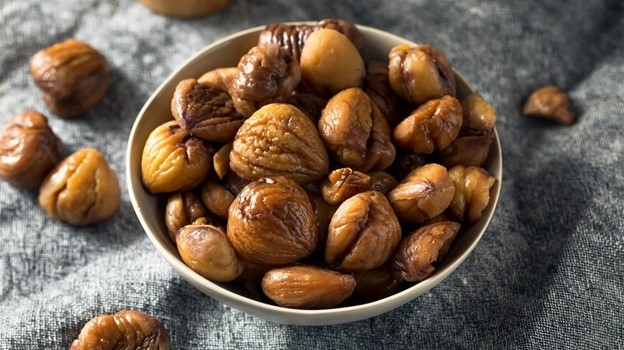Improve cardiovascular health
Chestnuts contain soluble fiber, which plays an important role in reducing bad cholesterol (LDL) and increasing good cholesterol (HDL). Thanks to that, chestnuts help prevent plaque buildup in the arteries, reducing the risk of atherosclerosis and other cardiovascular diseases.
The rich potassium content in chestnuts helps regulate blood pressure, reducing pressure on blood vessel walls and the heart. This helps reduce the risk of stroke and other dangerous cardiovascular complications. Antioxidants in chestnuts have anti-inflammatory effects, protect blood vessel walls, and prevent atherosclerosis.
 Chestnuts are known as the “king of dried fruits”. Photo: Healthline
Chestnuts are known as the “king of dried fruits”. Photo: HealthlineSupport blood sugar control
Chestnuts are a great choice for people with diabetes because they have a low glycemic index (GI). This means that chestnuts will not cause a spike in blood sugar after eating, helping to keep blood sugar levels more stable.
Not only that, some scientific studies have shown that chestnuts have the ability to improve the body's insulin sensitivity. Insulin is an important hormone that helps transport glucose from the blood into cells to create energy. When insulin sensitivity is improved, the body will use glucose more effectively, thereby helping to prevent and control diabetes.
Improve digestive health
Chestnuts are not only a delicious snack but also an excellent source of fiber for the body. The fiber in chestnuts helps increase intestinal motility, prevent constipation, and maintain a healthy digestive system. Chestnuts also contain prebiotics, which act as a food source for beneficial intestinal bacteria. Thanks to that, the intestinal microflora is balanced, helping to improve digestive health and the immune system.
Enhance brain function
Chestnuts are not only a delicious snack but also a rich source of essential nutrients for the brain. In particular, the content of B vitamins, especially vitamin B6, in chestnuts plays an important role in maintaining healthy nerve function. Vitamin B6 supports the production of neurotransmitters, helping to improve memory, increase concentration and process information effectively.

In addition, chestnuts also contain choline, an essential nutrient often referred to as a "brain vitamin". Choline is an important component of nerve cell membranes and participates in the synthesis of acetylcholine - a neurotransmitter related to memory and learning ability. Adequate choline supplementation helps enhance memory, learning and cognition, and helps prevent age-related memory loss.
Boost immunity
Vitamin C in chestnuts is a powerful antioxidant that can neutralize harmful free radicals in the body, thereby protecting cells from damage and preventing chronic diseases such as cancer and cardiovascular disease. In addition, vitamin C also helps increase the production of white blood cells, which are "warriors" that protect the body from attacks by bacteria, viruses and other pathogens.
In addition to vitamin C, chestnuts also contain a significant amount of zinc. Zinc is an essential mineral that plays an important role in many functions of the body, especially the immune system. Zinc is involved in the production and activity of immune cells, helping the body fight infections and diseases more effectively.
Improve bone health
Chestnuts are a rich source of magnesium and phosphorus. These two minerals play an important role in the formation and maintenance of strong bones. Magnesium helps the body absorb calcium effectively, while phosphorus is a component of bones and teeth. Adding chestnuts to your daily diet is a natural and safe way to improve bone health, especially for growing children and older adults at risk of osteoporosis.
Source: https://kinhtedothi.vn/viet-nam-co-vua-cua-cac-loai-qua-kho-bo-du-duong-nhung-it-nguoi-biet.html


































































































Comment (0)